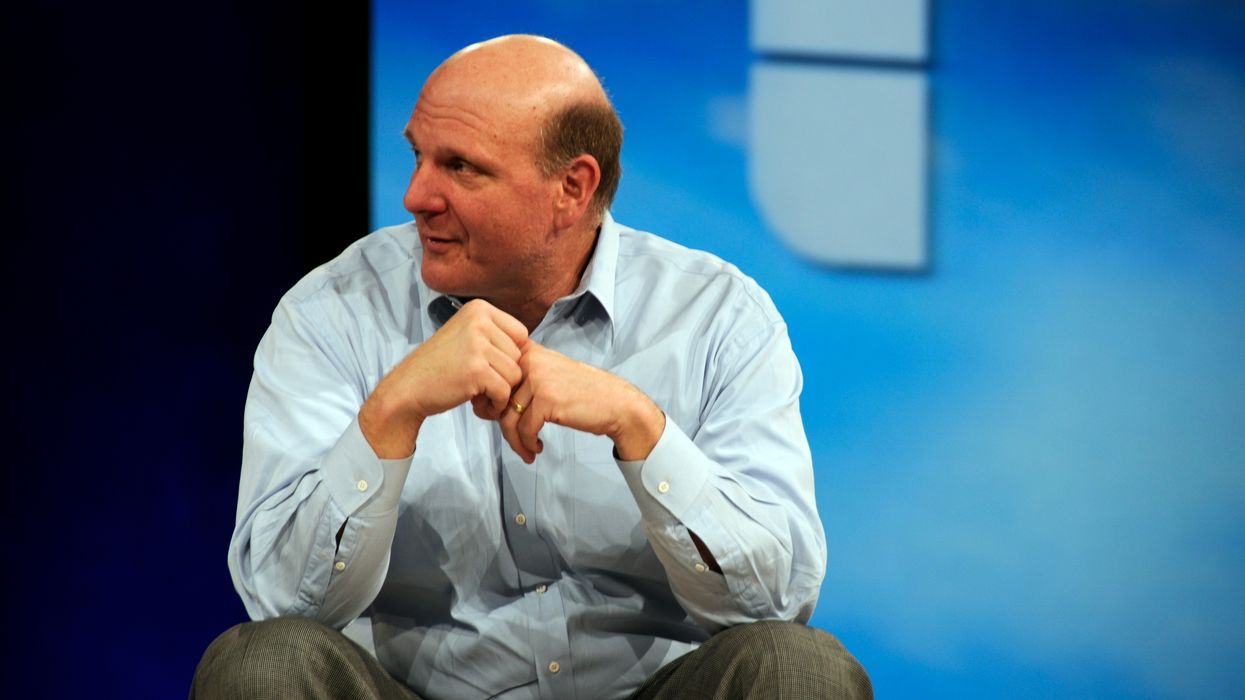How Ballmer Perfected the Monopoly Playbook
Ballmer’s career at Microsoft is often painted as the story of a bold leader guiding a tech giant through the new millennium. In reality, it was a case study in how to crush rivals and protect a monopoly. Under his watch, Microsoft racked up record fines from regulators; perfected its notorious strategy of “embrace, extend, extinguish;” and enforced a cutthroat internal culture that stifled collaboration. This wasn’t innovation. It was domination dressed up as genius.
When Ballmer became Microsoft’s CEO in 2000, the company was already facing a bruising US antitrust case over its efforts to crush competitors like Netscape and RealNetworks. European regulators soon followed, hitting Microsoft with record fines for abusing its monopoly. The Commission found that Microsoft had deliberately abused its dominant position by tying Windows Media Player to its operating system and undermining competition in server software.
At the center of these cases was a clear pattern: Microsoft used its dominance not to compete fairly but to block competitors, extend its monopoly, and extract rents from consumers and developers.
If journalism is to serve the public, it must puncture the myths of genius and demand accountability from those who profit most from monopoly and exploitation.
Ballmer did not invent these practices, but he perfected and defended them. The company’s infamous “embrace, extend, extinguish” strategy thrived during his reign: Adopt an open standard, add proprietary extensions, then use those extensions to break competitors’ products or force users into Microsoft’s ecosystem. A series of leaked internal memos known as the “Halloween Documents” revealed how Microsoft viewed open source software as a threat and laid out strategies to undermine it. Far from being a story of daring innovation, Microsoft under Ballmer became a story of protecting monopoly turf at any cost.
Internally, Ballmer presided over the now-notorious “stack ranking” system, in which managers were forced to rank employees against each other, ensuring that some were always labeled failures regardless of performance. Vanity Fair reported that this system was described by employees as “the most destructive process inside of Microsoft.” It encouraged backstabbing, punished collaboration, and destroyed morale.
Yet Ballmer’s reputation in the business press was rarely tarnished. Microsoft’s aggressive tactics and toxic culture were downplayed as part of the “rough and tumble” of the tech industry. Instead of being recognized as symptoms of a deeply flawed corporate ethos, they were cast as evidence of toughness, discipline, or even strategic brilliance.
Genius by Headline, Not by Record
This discrepancy points to a larger cultural problem: the way American media routinely turns billionaires into celebrities and treats monopolists as “innovators.” Stories often described Ballmer as a “visionary,” even while acknowledging that he missed entire waves of innovation—from mobile phones and search engines to social media. For example, he later admitted that Microsoft “missed mobile by clinging to Windows.” In interviews, he reflected that the early 2000s were defined by “missed opportunities,” and critics pointed out that he “missed every major trend in technology”
But this is not just about Ballmer. Consider how the press has lionized figures like Elon Musk, Jeff Bezos, Jamie Dimon, and the Silicon Valley founders of Google, Facebook, and Uber. Musk is often portrayed as a world-changing genius, yet his real talent lies in projecting an aura of promise rather than delivering consistent transformation. Bezos is hailed as the visionary who built Amazon into a global empire, but the company’s rise is grounded in widespread worker exploitation, aggressive union busting, and what Jacobin bluntly calls a legacy of exploitation. These examples show how easily media culture crowns billionaires as “visionaries” while overlooking the systemic harms that make their fortunes possible.
The mythology of the “genius CEO” is not harmless flattery. It is an ideological weapon. It convinces us that billionaires deserve their fortunes because they are smarter, bolder, and more visionary than everyone else. It hides the truth that their wealth comes from structural advantages, monopolies, and an economy rigged to socialize risk while privatizing reward.
Ballmer’s career is a perfect case in point. Few in the press asked whether Microsoft’s dominance strangled innovation or whether his leadership undermined workers and consumers. Instead, the coverage painted him as a colorful eccentric, a lovable billionaire, and above all a success story—as if his rise were earned brilliance rather than brute monopoly power.
Pablo Torre’s remarkable reporting on the Aspiration scandal is a reminder of what real journalism can do when it asks hard questions instead of recycling corporate talking points. His work not only exposes the hidden machinery of sports business but also shows why we need the same relentless scrutiny of CEOs and executives across industries. If journalism is to serve the public, it must puncture the myths of genius and demand accountability from those who profit most from monopoly and exploitation.
The Aspiration Illusion
The irony of Ballmer’s current predicament is almost too sharp. The company at the center of the scandal, Aspiration, branded itself as an “ethical financial” startup, promising consumers the ability to save the planet while banking. Its pitch was slick and appealing: Open an account, round up your debit-card purchases, and the company would plant trees or invest in clean energy The company even raised $135 million to expand its “conscious consumerism” model, promoting debit cards that supposedly planted a tree with every swipe. But investigations later showed that the green promises were exaggerated, with ProPublica revealing that the company counted trees not yet planted and diverted some consumer funds toward administrative costs rather than reforestation.
Indeed, Despite the glossy promises, testimony from former employees and bankruptcy filings exposed a starkly different reality. It was less an environmental company than a marketing engine, spending lavishly on celebrity endorsements such as the $28 million Kawhi Leonard deal now under scrutiny, while delivering little measurable benefit to the climate. The startup positioned itself as a sustainable alternative to traditional banks, promoting tree-planting debit cards. Behind the branding, however, its financial practices were shaky. Aspiration relied on questionable deals to inflate its revenue and set up a high-profile IPO, even as its business model was already beginning to unravel.
Why do we continue to celebrate executives who built their fortunes on monopolistic practices, even as those practices hollow out innovation and concentrate wealth?
If Ballmer was indeed duped by Aspiration, as he claims, it only highlights how easily billionaires buy into glossy branding that flatters their image as progressive leaders. After the scandal broke, Ballmer admitted he felt “embarrassed and kind of silly” for not seeing through the company’s flaws. Yet Aspiration’s collapse alongside a multimillion-dollar “no-show” endorsement deal is not an outlier. It is a symptom of how much of today’s tech and finance sector manufactures a fraudulent sense of progress and value, dressing up speculation and extraction as innovation. In this world of legalized scams and corporate greenwashing, Ballmer’s embarrassment is less an excuse than a reminder of how disconnected billionaire investors are from the human and ecological costs of their money.
Aspiration’s story also echoes a broader pattern. Theranos promised a revolution in blood testing, WeWork styled itself as the future of work, and FTX declared it would reinvent finance. Each was celebrated as visionary until the façade collapsed, leaving behind fraud, debt, and disillusionment. These high-profile failures reveal how the mythology of innovation is repeatedly weaponized to disguise little more than hype, speculation, and exploitation. The media and investors continue to fall for it, again and again.
A Deeper Reckoning
The NBA investigation may or may not conclude that Ballmer violated the rules. But the larger scandal here is not limited to basketball. It is about how our culture treats men like Ballmer as role models—how we conflate wealth with competence, market share with innovation, and ruthless opportunism with genius.
It is also about how the very firms that claim to be solving our most urgent crises, from the climate emergency to economic inequality, are often vehicles for speculation and greenwashing, not solutions. They promise progress but deliver only shareholder returns and a deeper entrenchment of the same unequal and unsustainable order.
The Ballmer story forces us to ask harder questions. Why do we accept that billionaires should own sports teams at all, turning civic institutions into vanity projects for the ultra rich? Why do we continue to celebrate executives who built their fortunes on monopolistic practices, even as those practices hollow out innovation and concentrate wealth? Why do we allow financial startups to market themselves as saviors of the planet while continuing to accelerate ecological collapse?
Breaking the Billionaire Spell
The real lesson of this scandal is that we must break the spell of billionaire mythology. Ballmer is not a singular villain; he is an emblem of an age in which billionaires are lauded as saviors while their empires rest on monopoly, exploitation, and illusion. The media has played a crucial role in maintaining this façade, selling the public a narrative of “genius” to justify inequality.
A more honest narrative would recognize that the wealth of men like Ballmer was built on systems of exclusion, not innovation. It would expose the ways that corporate culture, whether in Big Tech or in the world of “ethical finance,” uses the language of progress to mask exploitation. And it would challenge the very legitimacy of an economy in which billionaires can fail upward, celebrated as geniuses even as their companies and investments leave wreckage behind.
What we need are not more billionaire idols but real accountability. It is long past time to stop confusing power with brilliance and to recognize that genuine progress will never come from self-styled saviors at the top. It will come from democratic action, collective struggle, and the hard work of reshaping our economy around justice rather than monopoly and the myth of capitalist progress.


